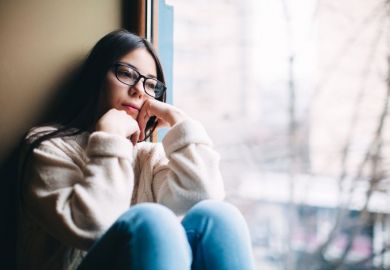The mental health of US college students does not appear to be rebounding as Covid eases, suggesting the need for more direct action to help revive campus norms and social bonds, an investigation has found.
The assessment of more than 1,100 students at the University of Pittsburgh showed that declines on measures of physical activity and mental well-being that began with the pandemic in early 2020 persisted into the spring 2021 semester even as vaccines became available.
For reasons not immediately clear, the researchers said, large numbers of students appeared to be having trouble re-establishing the norms of their individual and social lifestyles that were disrupted by the social isolation of the pandemic.
“Unfortunately, we don’t have an answer” that explains the data, said one of the researchers, Osea Giuntella, an assistant professor of economics at Pittsburgh. “We’re really just documenting this fact – something is going on. I think it’s alarming that we don’t really know why.”
Pandemic-related declines in mental health on colleges campuses and more broadly across society have been well documented. Dr Giuntella said his team’s work – published in Scientific Reports, the online peer-reviewed journal owned by Nature – serves to warn universities that they cannot assume that those problems will simply fade away as campuses reopen.
Many institutional leaders have been suspecting as much. At an annual media round-table discussion hosted by Arizona State University, several university presidents said that they kept seeing increases in student mental health problems and that they expected that to continue upward, especially as Covid-related fears and restrictions remain.
“People were probably on the edges much more than they realised that they were just before this, and this is pushing them over the edge,” one of them, Michael Rao, the president of Virginia Commonwealth University, said of the ongoing pandemic-related uncertainties.
“It goes to show you how vulnerable so many of our people are,” Professor Rao said. “It isn’t just students experiencing significant mental health issues – it’s a lot of people, and you’re in a society that is becoming increasingly unpredictable.”
Leaders in both higher education and the rest of US society must accept the need to make much greater investments in the area, Professor Rao said.
In studying Pittsburgh students, Dr Giuntella worked with colleagues at Carnegie Mellon University, the University of California, San Diego, and the University of Gothenburg, supported by the Abdul Latif Jameel Poverty Action Lab at the Massachusetts Institute of Technology.
The participants consisted of several hundred students per semester from spring 2019 through to spring 2021. Each was given a Fitbit device for measuring their physical activity, and they completed surveys to rank them on the Center for Epidemiologic Studies Depression Scale.
The average number of steps they took daily dropped from nearly 10,000 to below 5,000 in the spring of 2020, but did not rebound above 7,000 this past spring. Almost half of participants this past spring were rated as being at risk of clinical depression, compared with a little over one-third before the pandemic.
Other studies have demonstrated the importance of physical activity to mental well-being. Two such studies, published recently by researchers at North Carolina State University, used surveys of hundreds of college students and other youth to show that declines in outdoor activities and park use during Covid produced lower mental health measures.
Universities should push additional research on their campuses to learn more about the factors among their own students, Dr Giuntella said. Unanswered questions, he said, included whether students were not moving around as much as they did before Covid because they were afraid to do so, or were actually restricted; whether campuses could be doing more to facilitate student social interactions; and whether other factors could be involved in persistent mental health struggles, such as job-related anxieties.
Register to continue
Why register?
- Registration is free and only takes a moment
- Once registered, you can read 3 articles a month
- Sign up for our newsletter
Subscribe
Or subscribe for unlimited access to:
- Unlimited access to news, views, insights & reviews
- Digital editions
- Digital access to THE’s university and college rankings analysis
Already registered or a current subscriber?








